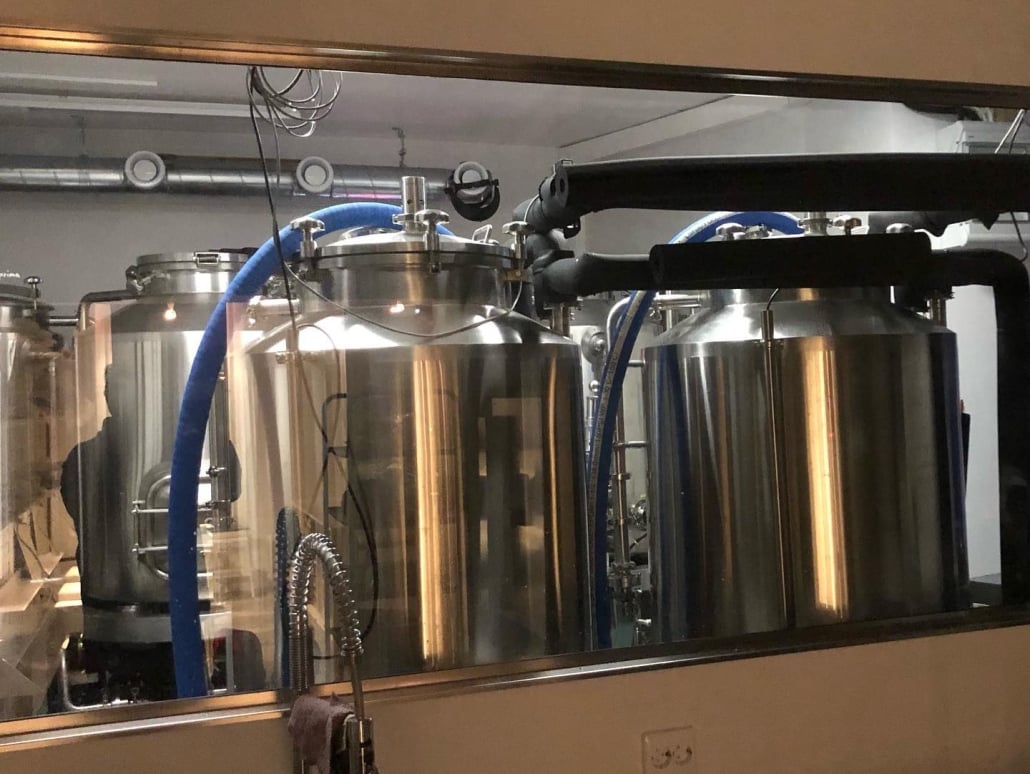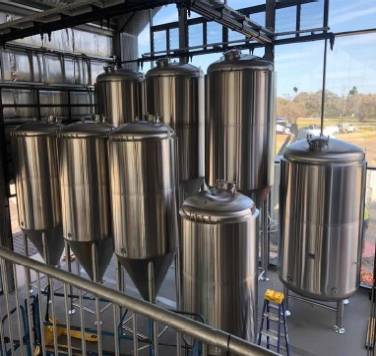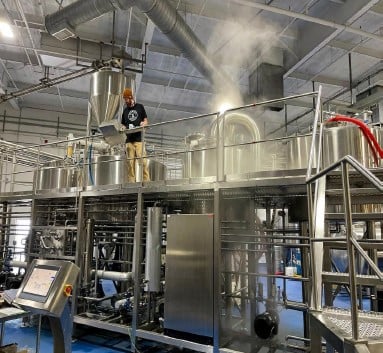Brewing Equipment for Sale
Whether you’re an enthusiastic homebrewer yearning to create craft beers in your garage or an ambitious entrepreneur setting up a full-fledged brewery, acquiring the right equipment is paramount. This guide delves into the exciting world of brewery equipment for sale, providing a roadmap to navigate the choices you’ll encounter.
Overview: Brewery Equipment for Sale
Brewery equipment encompasses a vast array of tools, each playing a crucial role in the brewing process. From kettles for boiling wort (unfermented beer) to fermenters where magic happens as yeast transforms wort into beer, the equipment you select will determine the scale and efficiency of your brewing operation.
Key Considerations:
- Production Volume: Are you brewing for personal enjoyment or aiming for commercial distribution? This significantly impacts the size and capacity of the equipment you’ll need.
- Budget: Brewery equipment ranges from cost-effective homebrew setups to high-end industrial systems. Define your budget upfront to guide your selections.
- Experience Level: As a homebrewer starting out, a simpler system might be ideal. Conversely, professional brewers will require robust, large-scale equipment.

Essential Brewery Equipment Guide
Here’s a breakdown of the core equipment categories you’ll encounter when browsing through brewery equipment for sale:
| Equipment Category | Description |
|---|---|
| Brewhouse System | The heart of the brewing process, the brewhouse system typically consists of a mash tun (for steeping grains in water), a lauter tun (for separating wort from spent grain), and a kettle (for boiling the wort). |
| Fermentation Tanks | These vessels house the wort during fermentation, where yeast transforms sugars into alcohol and CO2. Options include unitanks (combined fermentation and serving tanks) and brite tanks (for conditioning and carbonating beer). |
| Conditioning and Bottling/ Canning Equipment | After fermentation, beer undergoes conditioning for clarity and flavor stabilization. Equipment for bottling or canning includes bottling lines and canning lines. |
| Cleaning and Sanitation Equipment | Maintaining a clean and sanitized brewing environment is crucial. Expect to invest in cleaners, sanitizers, and CIP (Cleaning In Place) systems. |
| Monitoring and Control Systems | These systems track and regulate factors like temperature, pressure, and flow during brewing. |
Factors to Consider When Choosing Equipment:
- Material: Stainless steel is the industry standard for its durability and sanitation benefits.
- Capacity: Select equipment sized appropriately for your desired batch volume.
- Automation Level: Higher automation offers greater consistency but comes at a premium cost.
- Expandability: Consider equipment with modularity to accommodate future growth.
Brewery Equipment Features for Sale
Beyond core functionality, various features enhance the capabilities and efficiency of brewery equipment:
- Jackets: Jackets allow precise temperature control of the brewing process.
- Glycol Chillers: These systems provide chilled glycol to cool jackets for optimal temperature regulation.
- Carbonation Equipment: Allows precise control of carbon dioxide levels in beer.
- Filtration Systems: Optional for creating clear beers, filtration systems remove yeast and other particles.
- Automation Systems: Sophisticated systems automate brewing processes for increased consistency and efficiency.
Balancing Features and Needs:
While these features offer advantages, they also add complexity and cost. Carefully evaluate your needs and budget to determine which features provide the most value for your brewery.
Brewery Equipment Capacity, Space, Design & Layout
Matching Equipment Capacity to Production Goals:
- Homebrew Systems: Typically range from 1-gallon to 5-gallon capacities, perfect for small-batch brewing.
- Pilot Systems: Ideal for recipe development and small-scale production runs, pilot systems range from 10-barrel to 50-barrel capacities (a barrel is 31 gallons).
- Production Breweries: For commercial breweries, systems range from 50-barrel to hundreds of barrels, depending on production volume.
Space Considerations:
- Footprint: Measure your available brewing space to ensure chosen equipment fits comfortably.
- Headroom: Account for the vertical clearance required for tanks and other equipment.
- Scalability: Plan for future growth by considering equipment that can be expanded upon.
Designing an Efficient Brewery Layout:
A well-designed layout optimizes workflow and minimizes wasted space. Here are some key principles:
- Gravity Flow: Whenever possible, utilize gravity flow to move liquids between equipment stages.
- Minimize Transfers: Reduce the need for manual pumping by positioning equipment in a logical flow sequence.
- Cleaning and Sanitation Integration: Designate a dedicated space for cleaning and sanitation to streamline this vital process.
Suppliers of Brewery Equipment for Sale
The landscape of brewery equipment suppliers is vast, catering to various needs and budgets. Here’s a glimpse into the supplier landscape:
| Supplier Type | Typical Customer | Pros | Cons |
|---|---|---|---|
| Homebrew Shops: These local stores offer a curated selection of homebrewing equipment, often with expert advice and starter kits. | Homebrewers | Readily available equipment, expert guidance | Limited selection, potentially higher prices |
| Online Retailers: Several online retailers offer a wider selection of equipment at competitive prices. | Homebrewers and professional breweries | Extensive selection, competitive pricing | Limited technical support, may require assembly |
| Brewery Equipment Manufacturers: These companies specialize in designing and manufacturing brewery equipment, often offering custom solutions. | Professional Breweries | High-quality, custom-designed equipment | Higher cost, longer lead times |
| Used Equipment Brokers: Used equipment brokers offer pre-owned brewery equipment at a significant cost savings. | Budget-conscious homebrewers and professional breweries | Significantly lower cost | Equipment condition may vary, potential for outdated technology |
Choosing the Right Supplier:
- Reputation: Research the supplier’s reputation for quality, customer service, and lead times.
- Experience: Select a supplier with experience catering to your brewery size and production goals.
- Service and Support: Ensure the supplier offers adequate after-sales support, including spare parts and technical assistance.
Brewery Equipment for Sale: Price Range
The cost of brewery equipment varies significantly depending on factors like:
- Scale: Homebrew systems are substantially cheaper than commercial brewery setups.
- Features: Automation, advanced temperature control systems, and filtration add to the cost.
- Material: High-grade stainless steel is more expensive than lower-grade materials.
- New vs. Used: Used equipment offers significant cost savings but may require maintenance or upgrades.
Here’s a table outlining a general price range for different equipment categories:
| Equipment Category | Homebrew (1-gallon to 5-gallon) | Pilot System (10-barrel to 50-barrel) | Production Brewery (50+ Barrels) |
|---|---|---|---|
| Brewhouse System | \$100 – \$5,000 | \$50,000 – \$500,000 | \$500,000+ |
| Fermentation Tanks | \$200 – \$5,000 | \$10,000 – \$100,000 | \$100,000+ |
| Conditioning & Bottling/ Canning Equipment | \$200 – \$5,000 | \$25,000 – \$250,000 | \$250,000+ |
| Cleaning & Sanitation Equipment | \$100 – \$1,000 | \$5,000 – \$25,000 | \$25,000+ |
| Monitoring & Control Systems | \$100 – \$1,000 | \$10,000 – \$50,000 | \$50,000+ |
Remember: These are ballpark figures, and actual prices can vary considerably.
Installation, Operation & Maintenance of Brewery Equipment
Installation:
- Complexity of installation varies depending on equipment size and automation level.
- Some equipment may require professional installation, particularly for larger systems.
Operation:
- For homebrew systems, basic brewing knowledge is sufficient.
- Commercial breweries often require trained personnel to operate complex equipment.
Maintenance:
- Regular cleaning and sanitation are crucial to prevent contamination and ensure equipment longevity.
- Develop a comprehensive maintenance plan to address preventive maintenance tasks and potential repairs.
Ongoing Costs:
- Factor in the cost of ongoing maintenance, cleaning supplies, utilities, and potential repairs.
How to Choose a Brewery Equipment Supplier
Here’s a roadmap to guide you in selecting the most suitable brewery equipment supplier:
- Define Your Needs: Determine your production goals, budget, and desired level of automation.
- Research Suppliers: Explore various suppliers, considering their product offerings, customer reviews, and areas of expertise.
- Request Quotes: Obtain quotes from several shortlisted suppliers, ensuring the quotes include detailed equipment specifications, pricing breakdowns, and lead times.
- Evaluate Proposals: Meticulously compare quotes, evaluating factors like equipment quality, features, warranty terms, after-sales service, and total cost of ownership (including installation, maintenance, and potential upgrades).
- Ask Questions: Don’t hesitate to ask any questions you may have regarding the equipment, its operation, and the supplier’s capabilities.
- Visit the Supplier (if possible): Ideally, visit the supplier’s facilities to assess their manufacturing processes and get a firsthand look at the equipment.
- Make an Informed Decision: Based on your research, quotes, and communication with suppliers, select the partner that best aligns with your needs and budget.
Brewery Equipment for Sale: Pros and Cons
Owning Your Brewery Equipment:
Pros:
- Control and Customization: You have complete control over your brewing process and can customize your equipment to fit your specific needs.
- Long-Term Investment: High-quality equipment can last for decades with proper care, providing a return on your investment.
- Sense of Ownership: Owning your equipment fosters a sense of pride and accomplishment in your brewing endeavors.
Cons:
- Upfront Cost: The initial investment in brewery equipment can be substantial, particularly for commercial setups.
- Storage Requirements: Brewery equipment can be bulky and requires dedicated storage space.
- Maintenance Responsibility: You are responsible for ongoing maintenance, cleaning, and potential repairs.
Utilizing a Brewing Services Company:
Pros:
- Lower Initial Cost: No upfront investment in equipment is required.
- Flexibility: You can brew a wider variety of beers without needing dedicated equipment for each style.
- Reduced Maintenance Burden: The brewing services company handles equipment maintenance and cleaning.
Cons:
- Less Control: You may have less control over the brewing process and may be limited by the equipment and ingredients available at the brewing services company.
- Ongoing Costs: Fees for using the brewing services company can add up over time.
- Scheduling Challenges: Depending on the demand, you may need to schedule brewing time in advance.
The Right Choice for You:
The decision of owning your equipment versus using a brewing service company depends on your individual circumstances. Consider your budget, production goals, desired level of control, and brewing experience when making this crucial choice.

FAQ
Here are some frequently asked questions (FAQs) regarding brewery equipment for sale:
| Question | Answer |
|---|---|
| What is the best type of brewery equipment for homebrewers? | The best equipment for homebrewers depends on their experience level and budget. For beginners, a simple extract brewing setup is a great starting point. As experience grows, grain brewing systems offer more control and flexibility. |
| How much does it cost to set up a home brewery? | Home brewery setups can range from a few hundred dollars to several thousand dollars, depending on the equipment chosen and desired level of automation. |
| What permits and licenses do I need to open a brewery? | Permitting requirements vary depending on your location. Research local and federal regulations to determine the necessary permits and licenses for operating a brewery. |
| What are some of the challenges of opening a brewery? | The brewing industry is competitive. Challenges include obtaining funding, securing permits, developing a strong brand identity, and effectively marketing your beers. |
| Where can I find used brewery equipment? | Several online marketplaces and used equipment brokers specialize in selling pre-owned brewery equipment. |
Share this entry
Interested in learning more about Brewing Systems including additional details and pricing information? Please use the form below to contact us!
YOLONG BREWERY EQUIPMENT FAQS
- Commercial Brewery / Craft Brewery / Microbrewery / Nanobrewery
- What is The Difference Between Craft Beer and Industrial Beer?
- The Bespoke Differences In Custom Brewing Systems
- Everything You Need to Know About Kettle Souring
- How to Choose Brewing Equipment for Your business?
- How To Choose The-Best Partner To Build Your Commercial Microbrewing System?
- Two Detection Sensors That You Need To Use In Your Brewhouse System
- Remote Control Applications in Brewing Equipment/How does it work?
- How To Clean Your Brand New Brewery Tanks?

